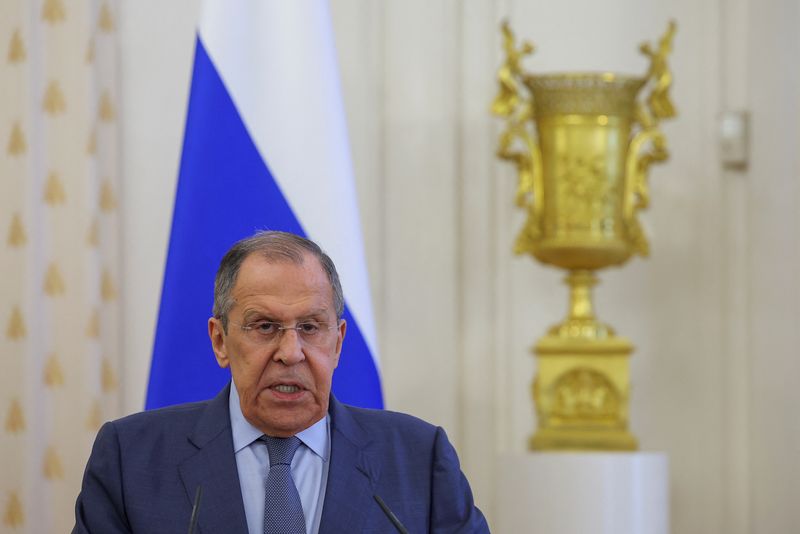By Guy Faulconbridge
MOSCOW (Reuters) -Russia said on Friday it saw no reason to extend the Black Sea grain deal beyond July 17 because the West had acted in such an "outrageous" way over the agreement, but assured poor countries that Russian grain exports would continue.
The United Nations and Turkey brokered the Black Sea Grain Initiative last July to help tackle a global food crisis worsened by Moscow's invasion of Ukraine - something it calls "a special military operation" - and its blockade of Ukrainian Black Sea ports.
The deal allows food and fertiliser to be exported from three Ukrainian ports - Chornomorsk, Odesa and Pivdennyi (Yuzhny). The agreement has been extended three times.
"The attitude of the West towards this deal is outrageous," Lavrov told reporters, pointing specifically to the positions of the United States and Britain.
Lavrov said one of the last straws for Russia was an attack on the Togliatti-Odesa ammonia pipeline, an attack he blamed on Ukraine which has in turn accused Russia of damaging it.
"I don't see what arguments there can be by those who would like to continue the Black Sea initiative," Lavrov said.
The United Nations on Friday said it was concerned no new ships had been registered under the Black Sea deal since June 26 - despite applications being made by 29 vessels - and called on all parties to "to commit to the continuation and effective implementation of the agreement without further delay."
U.N. spokesperson Farhan Haq said there are currently only 13 ships either loading in Ukrainian ports or travelling to and from Istanbul.
"The parties must ensure that additional vessels are allowed to sail the maritime humanitarian corridor in the Black Sea, which serves as a global lifeline for food security," Haq said. "The commencement of the harvest season underscores the urgency."
FREE GRAIN
Russia and Ukraine are two of the world's top agricultural producers, and major players in the wheat, barley, maize, rapeseed, rapeseed oil, sunflower seed and sunflower oil markets. Russia is also dominant in the fertiliser market.
If the deal collapses Russia will still export grain, Lavrov said.
"If the Black Sea Initiative ceases to operate, we will provide grain deliveries of a comparable or larger size to the poorest countries at our own expense, free of charge," Lavrov said.
Between 2018–2020, Africa imported $3.7 billion in wheat (32% of total African wheat imports) from Russia and $1.4 billion from Ukraine (12% of total African wheat imports), according to the United Nations.
To convince Russia to agree to the initiative, a three-year pact was also struck last July in which the United Nations agreed to help Moscow overcome any obstacles to its own food and fertilizer shipments.
Russia's specific demands are that Russian Agricultural Bank (Rosselkhozbank) be reconnected to the SWIFT payment system, that supplies of agricultural machinery and parts to Russia be resumed, and that restrictions on insurance and reinsurance are lifted.

Other demands include the resumption of the Togliatti-Odesa ammonia pipeline that lets Russia pump the chemical to Ukraine's main Black Sea port, and the unblocking of assets and accounts of Russian companies involved in food and fertiliser exports.
Russia says there has been no progress on any of those issues.